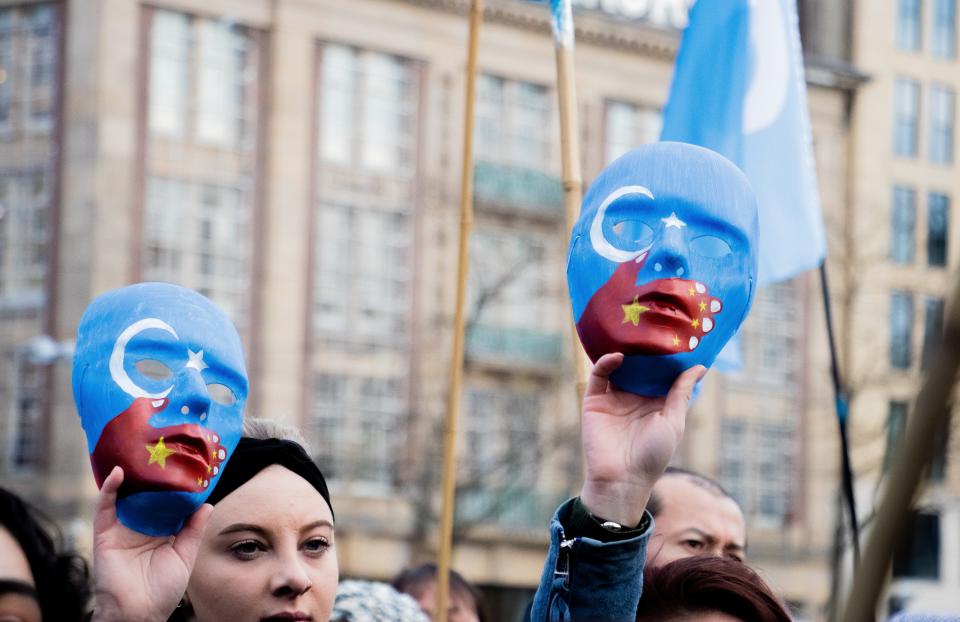Fashion brands Nike, Boohoo and H&M deny Uyghur forced labour allegations

Multiple fashion brands such as Nike (NKE), Boohoo (BOO.L), H&M (HM-B.ST) and North Face-owner VF (VFC) have denied allegations of forced labour in their supply chains in the Xinjiang region in China.
The brands and retailers expressed “shock” over allegations regarding the forced labour of Uyghur Muslims, as they were questioned by MPs at the Business, Energy and Industry Strategy (BEIS) committee.
It has been alleged that products involving Uyghur slave labour could be sold to UK consumers.
Reports suggest that 1 million Uyghur are being held in internment camps in the northern Chinese province.
The group director of responsible sourcing at Boohoo, Andrew Reaney, told MPs at the committee that the online retailer was “shocked” by reports regarding the Uyghurs and what’s happening in the region.
Reaney said: “We wrote to all our suppliers across the supply chain to confirm that we have no manufacturing or fabric links to that particular region.
“That was done and all of our suppliers confirmed that they have no manufacturing or fabric links to that region.” He stressed that Boohoo does “not knowingly source any yarn or fabric” from the region.
MPs questioned auditing processes at the business after PwC resigned as Boohoo auditor following concerns over the working conditions in its UK supply chain.
It comes after Boohoo has been accused of paying workers in its Leicester supply chain as little as £3.50 ($4.60) an hour — far below the minimum wage of £8.72.
A review into the allegations was conducted by Alison Levitt QC in September and found “many failings” but it ultimately cleared Boohoo from allegations of deliberately allowing poor conditions and low pay for garment workers.
Other reports also alleged that the company may have relied on factories in Leicester that did not close during the first UK lockdown, which could have contributed to the second wave coronavirus outbreak in the city.
Levitt’s review recommended “improvements to Boohoo's related corporate governance, compliance and monitoring processes.”
Watch: H&M cuts ties with Chinese supplier over forced labour allegations
READ MORE: Amazon, Nike, and IKEA questioned by MPs over alleged forced labour links
Meanwhile, David Savman, head of supply chain at H&M, said the Swedish-based retailer worked with accreditation groups for its supply chain which stopped buying cotton in the Xinjiang region in light of the reports.
“When these serious allegations came up we made investigations into all of our suppliers,” he told MPs.
“We didn’t find any proof of any breach of our sustainability commitments, where we have very clear guidance of how our ethical processes should happen.”
The vice president of global footwear sourcing and manufacturing at Nike, Jaycee Pribulsky, said the US group was “deeply concerned” about the situation in the region.
Pribulsky told MPs: “Nike does not source any raw cotton. And regarding Xinjiang, Nike has confirmed with its suppliers that there are no spun yarns or textiles manufactured in the area in our products.”
Last month, the BEIS committee wrote to businesses across the fashion, retail and information technology sectors, as it explores the extent to which UK firms are exploiting the forced labour of Uyghur people in the Xinjiang region of China.
The letters included questions around supply-chain transparency, requesting compliance evidence and written feedback on how each company maintains visibility and combats modern slavery within their supply chains.
The BEIS Committee has written to the following companies: Adidas (ADS.DE), Amazon (AMZN), Boohoo Group, Gap (GPS), H&M, IKEA, Marks and Spencer (MKS.L), Nike, Puma (PUM.DE), Stella McCartney, The Walt Disney Company (DIS), TikTok, Victoria’s Secret and Zara.
A spokesperson for Puma told Yahoo Finance in October that it has no business relationship with Haoyuanpeng Clothing, one of the companies accused of engaging in forced labour in connection with Puma products.
The company said it had taken significant measures to ensure that there is no indirect involvement of Xinjiang labour in the manufacturing of its products. PUMA is in no way engaged in forced labour,” they said.
A spokesman for IKEA said that the company has taken the “decision to stop sourcing cotton from Xinjiang, China.”
Watch: Boohoo 'did not move quickly enough' on Leicester supply chain malpractice

 Yahoo Finance
Yahoo Finance 